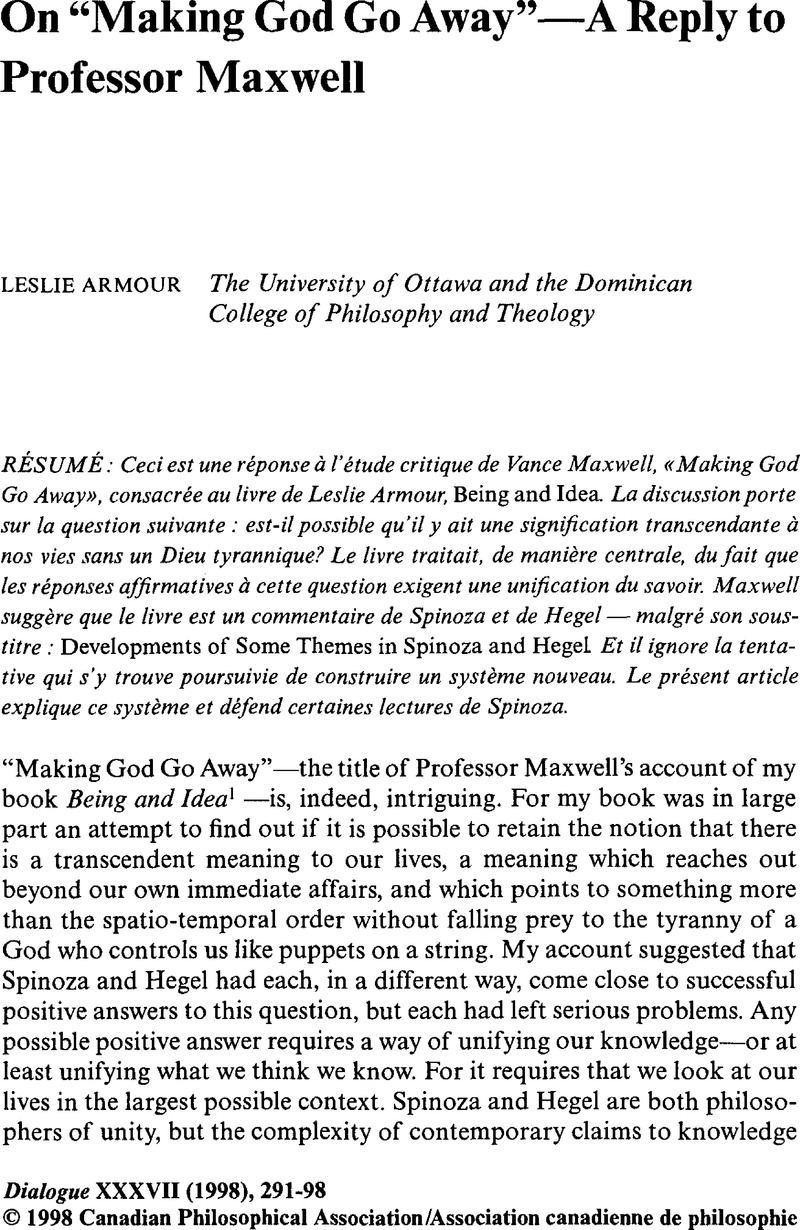No CrossRef data available.
Published online by Cambridge University Press: 13 April 2010

1 Maxwell, Vance, “Making God Go Away and Leave Us Alone,” Dialogue, 35, 4 (Fall 1996): 805–19CrossRefGoogle Scholar, and Armour, Leslie, Being and Idea, Developments of Some Themes in Spinoza and Hegel (Hildesheim: Georg Olms, 1992).Google Scholar
2 Descartes, in his letter to Queen Christine of Sweden, November 20, 1647 (AT 5, 81), argues that “freewill is in itself the noblest thing we have because it makes us in a certain manner equal to God and exempts us from being his subjects.” On Cusa, see Struever, Nancy S., Language of History in the Renaissance (Princeton: Princeton University Press, 1970), pp. 45–46Google Scholar. See also Levao, Ronald, Renaissance Minds and their Fictions (Berkeley: University of California Press, 1985).Google Scholar
3 Rapin, René, La Foy des derniers siècles (Paris: Sebastien Mabre-Cramoisy, 1679), p. 25.Google Scholar
4 Taylor, Charles, Hegel (Cambridge: Cambridge University Press, 1975), p. 240CrossRefGoogle Scholar. Indeed, Taylor argues that Hegel really turns the infinite into the finite. Hegel's view is that the true infinite is the “boundless.” But it cannot be apart from the finite, for then it would be bounded by it. Thus, the infinite must be a finite which is self-contained and forms a kind of circle. The examples, Taylor says, are “the categories which make up his [Hegel's] logic, the circle of levels of being which make up the philosophies of nature and spirit, the circle of roles which make up the state.” Thus, he says, “the infinite only exists in the order of the finite.”
5 The relation of the State and the Absolute is not ultimately clear. If one compares, for instance, the categories in the Science of Logic to the passage at the end of the Philosophy of Right, one is tempted to conclude that the actualization of the real State would be the coming of the Absolute into reality. For Hegel speaks in PR of “the reconciliation and resolution of all contradiction” (359). He also speaks of overcoming the categories of morality and the union of the “realm of fact” and the “realm of truth.” This pattern continues up to the Absolute Idea in the Science of Logic. But Hegel's association of the Absolute and God suggests that the Absolute must be beyond the State unless he intends the ultimate totalitarian notion that the State is God. And he does say that it is “the march of God in the world” (PR 258).
6 See Wissenschaft der Logik (Hamburg: Felix Meiner, 1966), Vol. 2, p. 506Google Scholar, translated as Science of Logic by Miller, A. V. (London: George Allen and Unwin, 1979), pp. 843–44.Google Scholar
7 It is “certitude” in the sense of firm conviction rather than “certainty” in the sense of manifest truth which one must suppose Professor Maxwell to have, given the range of counter-opinions about Spinoza.
8 Armour, Leslie, Pascal's Wager and the Human Paradox (Carbondale, IL: Southern Illinois University Press, 1993).Google Scholar
9 “Substance” and “God” are semantically interchangeable, so that it does not matter whether Spinoza calls substance God or God substance.
10 In a garbled reference on p. 9 of my book, Proposition 1 and Corollary 2 to Proposition 17 somehow got reduced to Corollary 1 to Proposition 1.
11 The reference is to p. 113 of my text, p. 811 of his.
12 Myers, Henry Alonzo, The Spinoza-Hegel Paradox (Ithaca, NY: Cornell University Press, 1944).Google Scholar
13 Hart, Alan, Spinoza's Ethics, Parts 1 and 2: A Platonic Commentary (Leiden: E. J. Brill, 1983).Google Scholar
14 Joachim, H. H., The Nature of Truth (Oxford: Clarendon Press, 1906).Google Scholar
15 Part 1, Proposition 29, Scholium. For everyone's convenience I have quoted from Samuel Shirley's straightforward translation (Indianapolis: Hackett, 1992), p. 50.Google Scholar
16 Langendoen, D. Terence and Postal, Paul M., The Vastness of Natural Languages (Oxford: Blackwell, 1984).Google Scholar